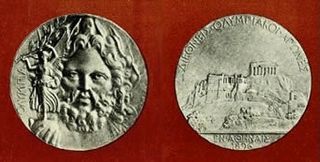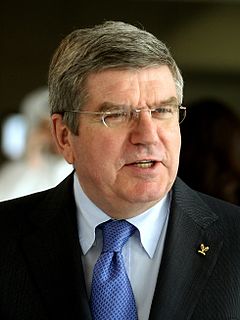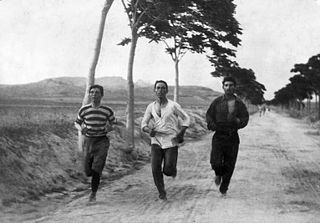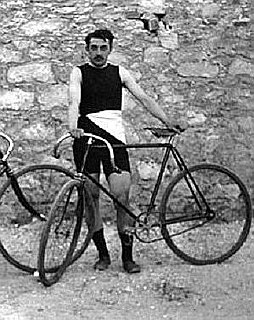Origin
The first Intercalated Games had been scheduled by the IOC in 1901 as part of a new schedule, where every four years, in between the internationally organised Games, there would be an intermediate Games held in Athens.
This was a compromise: after the successful Games of Athens 1896 the Greeks suggested they could organize the Games every four years, as they had the venues, had proven to be able to hold well-organised Games, and had received substantial public support.
Pierre de Coubertin had originally intended for the first Games to be in Paris in 1900, and he had no intention of losing not only the première for Paris, but the Games as well. Thus, the second Games were held in Paris in 1900. These Games were overshadowed by the Exposition Universelle: to make matters worse, their organizing committee disagreed with de Coubertin's ideas to such an extent that he resigned. The organization of the 1900 Games appears haphazard by today's standards. Although some events, such as archery, drew widespread attention, many others were poorly attended. Historians' opinions still differ over which events should be considered "Olympic".
The IOC subsequently supported the Greek idea by granting them a second series of quadrennial Games between the first series. All of the Games would be International Olympic Games, though half of them would follow De Coubertin's idea of organising them in different countries to make the Olympic Movement more international: the other half would follow the Greeks' idea of a permanent home, with the Greek Committee of the Olympic Games as experienced organisers.
While this was a departure from the ancient schedule, it was expected that if the ancient Greeks could keep a four-year schedule, then the modern Olympic Movement could keep a two-year schedule. As 1902 was now too close to be logistically workable, and Greece was also experiencing political and economic difficulties, the 2nd Olympic Games in Athens were scheduled for 1906.
The 1904 Summer Olympics in St. Louis, Missouri were overshadowed by the Louisiana Purchase Exposition, and their organization was even worse than that of Paris 1900, while travel difficulties meant that only 20% of the athletes were non-American; of these, half were Canadian.
It was clear the Olympic Movement was in a dire situation, and desperately needed to recapture the spirit of Athens 1896: it also needed to do so quickly, as to those who did not participate in St. Louis, Rome 1908 was a gap of eight years, by which time there would be little if any goodwill left for the Games.
To make matters worse, Rome was also planning an Exhibition at the same time as the Games, which had been responsible for the failures of Paris and St. Louis.
To the IOC, the 1906 Athens Games being just around the corner would have been a lifeline: while De Coubertin still opposed the idea, and did not do anything more than his function required him to, the IOC as a whole gave the Greek organizing committee full support for the organisation.
Decline
The Greeks were, despite their best efforts, unable to keep the schedule for 1910. While there had been serious political tensions in the Balkans, the modern Greeks found out their ancient ancestors were right: a two-year interval was too short. There had been effectively a gap of six years before Athens 1906, due to the predominantly American nature of the 1904 St. Louis Games, but Athens 1910 would have left a gap of two years after the 1908 London Games, which would have made it virtually impossible to prepare.
With Athens 1910 being a failure, the faith in the Intercalated Games diminished: as a result, plans for Athens 1914 got even less support before the outbreak of World War I, meaning any further Intercalated Games had to wait until after the war, which ended in 1918.
Since it had been twelve years since Athens 1906, and in any case, the next possible event would have been in 1922 - sixteen years after the first - the idea of Intercalated Games was given up entirely.
Downgrading
Since the 2nd International Olympic Games in Athens had become an exception, the personal views of various IOC chairmen caused the IOC to retroactively downgrade the 1906 Games, and their explanation for the Games became that they had been a 10th anniversary celebration.
Also, more stress was placed on the continuing sequence of four-year Olympiads, and the Games of 1906 did not fit into this. Hence, the IOC currently does not recognize Athens 1906 as Olympic Games, and does not regard any events occurring there (such as the setting of new records or the winning of medals) as official.
Despite this, the success of Athens 1906, however, may have been what kept the Olympics alive after the failures of 1900 and 1904. As the next Games are always built on the successes of the last, the innovations of Athens were used again in London, and eventually became Olympic tradition.
In fact, the influence of the First Intercalated Games pervades the Olympics, with the holding of the Games concentrated in a small time period in a small area.

The modern Olympic Games or Olympics are the leading international sporting events featuring summer and winter sports competitions in which thousands of athletes from around the world participate in a variety of competitions. The Olympic Games are considered the world's foremost sports competition with more than 200 nations participating. The Olympic Games are normally held every four years, and since 1994, has alternated between the Summer and Winter Olympics every two years during the four-year period.

Charles Pierre de Frédy, Baron de Coubertin was a French educator and historian, founder of the International Olympic Committee, and its second president. He is known as the father of the modern Olympic Games. He was particularly active in promoting the introduction of sport in French schools.

The Summer Olympic Games, also known as the Games of the Olympiad, are a major international multi-sport event normally held once every four years. The inaugural Games took place in 1896 in Athens, Greece, and most recently the 2020 Summer Olympics were celebrated in 2021 in Tokyo, Japan. The International Olympic Committee (IOC) organises the Games and oversees the host city's preparations. In each Olympic event, gold medals are awarded for first place, silver medals are awarded for second place, and bronze medals are awarded for third place; this tradition began in 1904. The Winter Olympic Games were created out of the success of the Summer Olympics. It is regarded as the largest and most prestigious multi-sport international event in the world.

The 1896 Summer Olympics, officially known as the Games of the I Olympiad and commonly known as Athens 1896, was the first international Olympic Games held in modern history. Organised by the International Olympic Committee (IOC), which had been created by French aristocrat Pierre de Coubertin, it was held in Athens, Greece, from 6 to 15 April 1896.
The 1906 Intercalated Games or 1906 Olympic Games was an international multi-sport event that was celebrated in Athens, Greece. They were at the time considered to be Olympic Games and were referred to as the "Second International Olympic Games in Athens" by the International Olympic Committee. However, the medals that were distributed to the participants during these games are not officially recognised by the Olympic Committee and are not displayed with the collection of Olympic medals at the Olympic Museum in Lausanne, Switzerland.

The 1900 Summer Olympics, today officially known as the Games of the II Olympiad and also known as Paris 1900, were an international multi-sport event that took place in Paris, France, from 14 May to 28 October 1900. No opening or closing ceremonies were held.

An Olympic medal is awarded to successful competitors at one of the Olympic Games. There are three classes of medal to be won: gold, silver, and bronze, awarded to first, second, and third place, respectively. The granting of awards is laid out in detail in the Olympic protocols.

Rugby union has been a men's medal sport at the modern Summer Olympic Games, being played at four of the first seven competitions. The sport debuted at the 1900 Paris games where the gold medal was won by the host nation. It was subsequently featured at the London games in 1908, the Antwerp games in 1920 and the Paris games in 1924.

National Olympic Committees that wish to host an Olympic Games select cities within their territories to put forth bids for the Olympic Games. The staging of the Paralympic Games is automatically included in the bid. Since the creation of the International Olympic Committee (IOC) in 1894, which successfully appropriated the name of the Ancient Greek Olympics to create a modern sporting event, interested cities have rivaled for selection as host of the Summer or Winter Olympic Games. 51 different cities have been chosen to host the modern Olympics: three in Eastern Europe, five in East Asia, one in South America, three in Oceania, nine in North America and the remainder in Western Europe. No Central American, African, Central Asian, Middle Eastern, South Asian, or Southeast Asian city has ever been chosen to host an Olympics.

Greece has a long presence at the Olympic Games, as they have competed at every Summer Olympic Games, one of only five countries to have done so, and most of the Winter Olympic Games. Greece has hosted the Games twice, both in Athens. As the home of the Ancient Olympic Games it was a natural choice as host nation for the revival of the modern Olympic Games in 1896, while Greece has also hosted the 2004 Summer Olympics. During the parade of nations at the opening ceremony of the Olympic Games, Greece always enters the stadium first and leads the parade to honor its status as the birthplace of the Olympics, with the notable exception of 2004 when Greece entered last as the host nation. Before the Games the Olympic Flame is lit in Olympia, the site of the Ancient Olympic Games, in a ceremony that reflects ancient Greek rituals and initiates the Olympic torch relay. The flag of Greece is always hoisted in the closing ceremony, along with the flags of the current and the next host country.

The Zappas Olympics, simply called Olympics at the time, were a series of athletic events held in Athens, Greece, in 1859, 1870, and 1875 sponsored by Greek businessman Evangelis Zappas. These games were one of the first revivals of the ancient Olympic Games in the modern era. Their success provided further inspiration for William Penny Brookes in England, whose games had been running since 1850, and the International Olympic Committee series from 1896.

The president of the International Olympic Committee is head of the Executive Board that assumes the general overall responsibility for the administration of the International Olympic Committee (IOC) and the management of its affairs. The IOC Executive Board consists of the president, four vice-presidents and ten other IOC members; all of the board members are elected by the IOC Session, using a secret ballot, by a majority vote.

The 400 metres at the Summer Olympics has been contested since the first edition of the multi-sport event. The men's 400 m has been present on the Olympic athletics programme since 1896 but nearly seventy years passed before the introduction of the women's 400 m, which has been held continuously since the 1964 Games. It is the most prestigious 400 m race at elite level. The competition format typically has two qualifying rounds leading to a final race between eight athletes.

The marathon at the Summer Olympics is the only road running event held at the multi-sport event. The men's marathon has been present on the Olympic athletics programme since 1896. Nearly ninety years later, the women's event was added to the programme at the 1984 Olympics.

The discus throw is one of four track and field throwing events held at the Summer Olympics. The men's discus throw has been present on the Olympic athletics programme since 1896. The women's event was first contested at the 1928 Olympics, being one of the five athletics events in the inaugural Olympic women's programme.
Alexandros, Count Merkati was a Greek golfer. He competed in the men's individual event at the 1900 Summer Olympics.

The individual sprint is a track cycling event held at the Summer Olympics. The event was first held for men at the first modern Olympics in 1896. It was held again in 1900, but not in 1904 when various races at different distances were conducted. The men's sprint returned to the programme in 1908 but was again omitted in 1912, when only road cycling competitions were held. After World War I, the men's sprint returned to the programme for good in 1920 and has been held every Games since. The women's sprint was added when women's track cycling was first held in 1988 and has been held every Games since.













